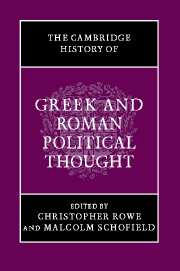Introduction
Published online by Cambridge University Press: 28 March 2008
Summary
The purpose of this volume is to provide a fresh, critical account of Greek and Roman political thought from its beginnings to the point at which The Cambridge History of Medieval Political Thought takes up the story, i.e. c. ad 350. The choice of this date is obviously to some extent arbitrary: there is no implication that ‘Greek and Roman’ political thinking then suddenly stops short, to be replaced by some entirely new way of thinking about political issues (the ‘medieval’). The latter sections of the volume, and the Epilogue, make clear the continuities, as well as the discontinuities, in political thought between the ‘ancient’ and the ‘medieval’ periods. Indeed, as the readers of the present History may discover, it is a moot question whether the discontinuities here are more significant than, for example, those between Greek and Roman ‘periods’, or better the ‘Classical’ and the ‘Hellenistic’ (beginning with the death of Alexander in the last quarter of the fourth century bc). The political triumph of Christianity over the Greco-Roman world - when for the first time an official, monotheistic, religion came to occupy centre-stage - was certainly momentous. But the changes in the political environment after the fourth century bc were themselves massive. What is striking in both cases is the extent to which political theorizing, if not political thought in the wider sense, remains comparatively, and remarkably, conservative, working as much by selection, adaptation and modification as by downright innovation.
- Type
- Chapter
- Information
- Publisher: Cambridge University PressPrint publication year: 2000
- 1
- Cited by



